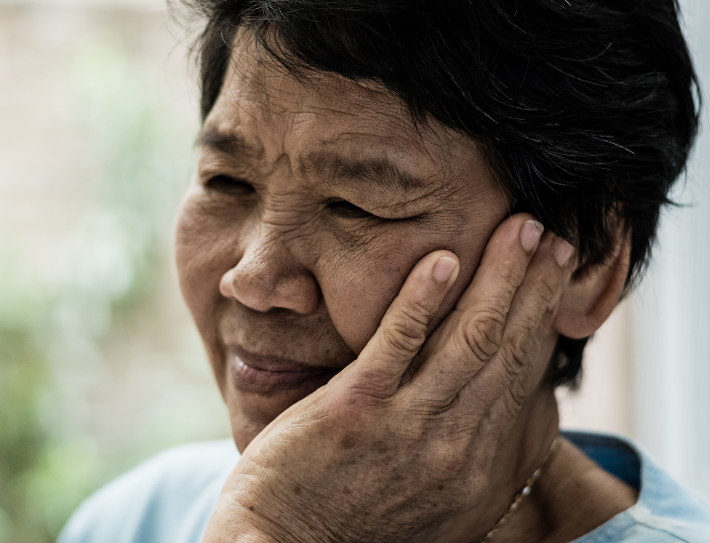Wondering if the pain you’ve been experiencing is TMD-related?
Some signs and symptoms of TMD-related pain are having persistent headaches, soreness in the jaw that gets worse throughout the day or frequent neck pains.
If you have been experiencing any of these symptoms or unsure of the type of pain you’re experiencing. Reach out to us to schedule an appointment with us for a diagnosis and treatment options.

Understanding the Pain and it’s Cause
At DP Dental, we look at the root cause of a pain, one of the most common issues is an airway dysfunction. Though the common interpretation of teeth grinding is stress, it is a by-product and not the root cause. Our body is amazing in that it compensates to protect. Grinding in one’s sleep is an airway protective function.
To help keep these pains at bay, we re-establish the harmony in your body through Gneuromuscular Dentistry. Which is based on establishing a balance between the muscles of the head and neck, the temporomandibular joints, and the teeth.
What is TMD?
The temporomandibular joint is a hinge that connects your jaw to your skull’s temporal bones, which are in front of each ear.
It lets you move your jaw up and down and side to side, so you can do things such as talk, chew and yawn. Problems with your jaw and the muscles in your face that control it are known as temporomandibular disorders (TMD).
Some of the symptoms could arise from problems with your jaw muscles or with the parts of the joint itself. Injury to your jaw, the joint, or dysfunction of the Orofacial muscles (also known as OMD), muscles of the head and neck can lead to TMD issues.
Other causes include:
- Grinding or clenching your teeth, which puts a lot of pressure on the joint
- Movement of the soft cushion or disc between the ball and socket of the joint
Common symptoms of TMD include:
- Pain or tenderness in your face, jaw joint area, neck and shoulders, and in or around the ear when you chew, speak, or open your mouth wide
- Problems when you try to open your mouth wide
- Jaws that get “stuck” or “locked” in the open or closed-mouth position
- Clicking, popping, or grating sounds in the jaw joint when you open, close your mouth or chew. The result of these sounds may or may not be painful
- A tired feeling on your face
- Trouble chewing or a sudden uncomfortable bite- as if the upper and lower teeth do not fit together properly
- Swelling on the side of the face
- You may also have toothaches, headaches, neck aches, dizziness, earaches, hearing problems, upper shoulder pain, and ringing in the ears (tinnitus).


Free Yourself from Persistent Aches and Pains
We understand not all dental splints or orthotic appliances will solve all TMD problems. With a conventional night guard, you would only be grinding on your night guard which does not relieve your jaws at all. Your jaws are left unprotected and soreness will still be present. At DP Dental we treat our patients with TENS Orthotic Device.
It is a custom-made orthotic guard fabricated in a specific laboratory in the US, made of specially handcrafted medical-grade acrylic that can be worn over the teeth to maintain a natural, most-balanced bite that is derived Gneuromuscularly by specially trained doctors.
TENS for Pain Relief
Transcutaneous Electrical Nerve Stimulation, also known as TENS, is a method of pain relief involving the use of a mild electrical current.
In other words, electrodes are attached to your skin that stimulates your nerves. Many kinds of TENS can cause many different effects.
Here at DP Dental, we use low-frequency TENS that causes your muscles to contract and relax in a precise sequence and at a scientifically determined rate so they can work out tension and eliminate toxins—it’s like an electric-stimulated self-massage.
In addition to relaxing your muscles, the TENS massage stimulates the release of endorphins, hormones that can block pain and improve your mood.
Once the TENS massage has relaxed your muscles, our trained dentist can examine your teeth and jaw to determine whether additional treatment may be necessary. Using sophisticated equipment that produces objective measurements, they choose the position of maximum rest for your muscles and whether your jaw can rest comfortably in that position.
After TENS therapy, most people need additional treatment, such as bite splints (also called orthotics, etc.) worn most of the time, dental restorations to build your bite back to healthy proportions etc.
